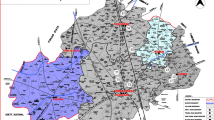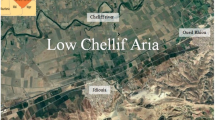Abstract
The availability of clean water is one of the pivotal objectives toward sustainable growth of any country. Pakistan, as a developing country, is facing the problem of bad water quality for decades and purification of groundwater has always been a problem. Thus, the present study aims to give a realistic picture of microbial contamination of groundwater of the two districts of the Province Punjab, Pakistan. Furthermore, we treat groundwater in our newly built robust water purification system which is cost-effective to check the efficiency of this system against microbial contaminations. Microbial contamination may lead to many water-borne diseases. The higher rates of microbial contamination including the levels of coliform, heterotrophic plate count and E. coli are found in 38 samples collected across different sites of the study area. Furthermore, we have treated these contaminated water samples by using a newly developed indigenous water purification system which is highly cost-effective and easy to use. All the contaminants were found below the WHO limit after treatment. Thus, we recommend the use of this robust water purification system which may help us to resolve the water crisis in an economically stressed country like Pakistan.
Access this chapter
Tax calculation will be finalised at checkout
Purchases are for personal use only
Similar content being viewed by others
References
American Public Health Association, Standard Methods for the Examination of Water and Waste Water. 19th edn. (American water works association, Water Environment Federation, Washington, 2005)
I.S. Babiker, A.A.M. Mohamed, Groundwater Quality assessment using GIS, the case of Omdurman area, central Sudan. Sudan J. Sci. 6, 22–33 (2014)
J. Chen, D. Zhu, C. Sun, Effect of heavy metals on the sorption of hydrophobic organic compounds to wood charcoal. Environ. Sci. Technol. 41, 2536–2541 (2007)
B. Daus, R. Wennrich, H. Weiss, Sorption materials for arsenic removal from water: a comparative study. Water Res. 38, 2948–2954 (2004)
M.A. Grace, M.G. Healy, E. Clifford, Performance and Surface clogging in intermittently loaded and slow sand filters containing novel media. J. Environ. Manage. 180, 102–110 (2016)
R.P. Hall, B. Van-Koppen, E. Houweling, The human right to water: the importance of domestic and productive water rights. Sci. Eng. Ethics 20, 849–868 (2014)
A. Hassan, M. Nawaz, Microbiological and physicochemical assessments of groundwater quality at Punjab, Pakistan. African J. Microbiol. Res. 8, 2672–2681 (2014)
S. Haydar, M. Arshad, J.A. Aziz, Evaluation of drinking water quality in urban areas of Pakistan: a case study of Southern Lahore. Pakistan J. Eng. Appl. Sci. 5, 16–23 (2009)
E. Joel, S.A. Musstab, A.S. Eqani, T. Khanam, R. Ullah, H. Shen, M. Berg, Extensive arsenic contamination in high-pH unconfined aquifers in the Indus Valley. Sci Adv. 3 (2017)
S. Kapaj, H. Peterson, K. Liber, P. Bhattacharya, Human health effects from chronic arsenic poisoning–a review. J. Environ. Sci. Health Part A 41, 2399–2428 (2006)
Z. Karim, Risk assessment of dissolved trace metals in drinking water of Karachi, Pakistan. Bull. Environ. Contamination Toxicol. 86, 676–678 (2011)
S. Khan, M. Shahnaz, N. Jehan, S. Rehman, M.T. Shah, I. Din, Drinking water quality and human health risk in Charsadda district, Pakistan. J. Clean. Prod. 60, 93–101 (2013)
A.H. Khan, S.B. Rasul, A.K.M. Munir, M. Habibuddowla, M. Alauddin, S.S. Newaz, A. Hussam, Appraisal of a simple arsenic removal method for ground water of Bangladesh. J. Environ. Sci. Health Part A 35, 1021–1041 (2000)
E.O. Longe, M.R. Balogun, Ground water quality assessment near a municipal landfill, Lagos, Nigeria. Res. J. Appl. Sci. Eng. Technol. 2, 39–44 (2010)
Q. Mahmood, S.A. Baig, B. Nawab, M.N. Shafqat, A. Pervez, B.S. Zeb, Development of low cost household drinking water treatment system for the earthquake affected communities in Northern Pakistan. Desalination 273, 316–320 (2011)
N.C. Mondal, V.S. Singh, V.K. Saxena, R.K. Prasad, Improvement of groundwater quality due to fresh water ingress in Potharlanka Island, Krishna Delta, India. Environ Geol. 55, 595–603 (2008)
NEQS, Guidelines for Drinking Water Quality, pp. 1–3, 2002
PCRWR, Water Quality Status of Major Cities of Pakistan 2015–16 (2016)
E.J. Podgorski,,S.A. Musstab, A.S. Eqani, T.K. Rizwan-Ullah, H. Shen, M. Berg, Extensive arsenic contamination in high-pH unconfined aquifers in the Indus Valley. Sci. Adv. 3 (2017)
M.M. Rehman, R. Naidu, P. Bhattacharya, Arsenic contamination in groundwater in the Southeast Asia region. Environ. Geochem. Health 31(1), 9–21 (2009)
D.C. Reid, A.C. Edwards, D. Cooper, E. Wilson, B.A. Mcgaw, The quality of drinking water from private water supplies in Aberdeenshire, UK. Water Res. 37, 245–254 (2003)
N. Shahid, Z. Zia, M. Shahid, H.F. Bakhat, S. Anwar, G.M. Shah, M.R. Ashraf, Assessing drinking water quality in Punjab, Pakistan. Polish J. Environ. Stud. 24, 2597–2606 (2015)
P.L. Smeldy, D.G. Kinniburgh, A review of the source, behavior and distribution of arsenic in natural waters. Appl. Geochem. 17, 517–568 (2002)
J.K. Tumwine, J. Thompson, M. Katua-Katua, M. Mujwajuzi, N. Johnstone, E. Wood, I. Porras, Diarrhoea and effects of different water sources, sanitation and hygiene behaviour In East Africa. Trop. Med. Int. Health. 7, 750 (2002)
UNESCO, International Initiative on Water Quality, 2015
WHO, Health impact of acidic deposition. Sci. Total Environ. 52, 157 (1986)
World Health Organization, Guidelines for Drinking Water Quality. 1 Recommendations, 3rd edn. (World health organization, Geneva, 2004)
Author information
Authors and Affiliations
Corresponding author
Editor information
Editors and Affiliations
Rights and permissions
Copyright information
© 2022 The Author(s), under exclusive license to Springer Nature Switzerland AG
About this paper
Cite this paper
Khan, A.M. et al. (2022). The Microbial and Physicochemical Analysis and Treatment of Groundwater of South Punjab, Pakistan. In: Heggy, E., Bermudez, V., Vermeersch, M. (eds) Sustainable Energy-Water-Environment Nexus in Deserts. Advances in Science, Technology & Innovation. Springer, Cham. https://doi.org/10.1007/978-3-030-76081-6_10
Download citation
DOI: https://doi.org/10.1007/978-3-030-76081-6_10
Published:
Publisher Name: Springer, Cham
Print ISBN: 978-3-030-76080-9
Online ISBN: 978-3-030-76081-6
eBook Packages: Earth and Environmental ScienceEarth and Environmental Science (R0)




